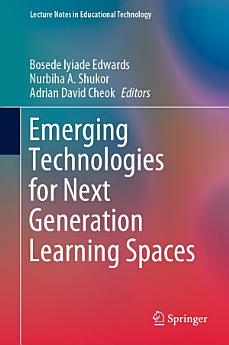Emerging Technologies for Next Generation Learning Spaces
About this ebook
About the author
Bosede Iyiade Edwards holds a Masters and Ph.D. in Educational Technology and is currently a research consultant with Arrows Education Malaysia and an Adjunct lecturer with Raffles University, Johor Bahru. She was a research fellow at the Imagineering Institute, Iskandar Puteri, Malaysia, where she began to focus on research on novel educational technologies for the future classroom. Her projects at the Imagineering institute (including the development of a robot teacher and a virtual-reality-based learning system for science instruction) were her expressions of the visions of the future classroom. She is also exploring the imminent changes in social interaction, including student–instructor relationships in the smart classroom of the next generation. She is exploring several collaborative projects related to the role of emerging technologies in both mainstream and special education classrooms.
Nurbiha A. Shukor holds a Ph.D. in Educational Technology and is a senior lecturer at Universiti Teknologi Malaysia. Her research interests are online learning, computer-supported collaborative learning, data mining in education and augmented reality. She has five registered, educational technology-related intellectual properties and has received several national and international grants. She is currently the manager for Open Education Resources at Universiti Teknologi Malaysia, Malaysia, where she is a senior lecturer at the Department of Educational Science and Creative Multimedia in the School of Education, Faculty of Social Science and Humanities.
Adrian David Cheok AM is Full Professor at i-University Tokyo, Director of the Imagineering Institute, Malaysia, Visiting Professor at Raffles University, Malaysia, Visiting Professor at University of Novi Sad-Serbia, on Technical faculty “Mihailo Pupin”, Serbia, Faculty of Ducere Business School, and CEO of Nikola Tesla Technologies Corporation. He is Founder and Director of the Mixed Reality Lab, Singapore. He was formerly Professor of Pervasive Computing, University of London, Full Professor and Executive Dean at Keio University, Graduate School of Media Design and Associate Professor in the National University of Singapore. He has previously worked in real-time systems, soft computing, and embedded computing in Mitsubishi Electric Research Labs, Japan. In 2019, The Governor General of Australia, Representative of Her Majesty the Queen Elizabeth II, has awarded Australia’s highest honour the Order of Australia to Adrian David Cheok for his contribution to international education and research.






